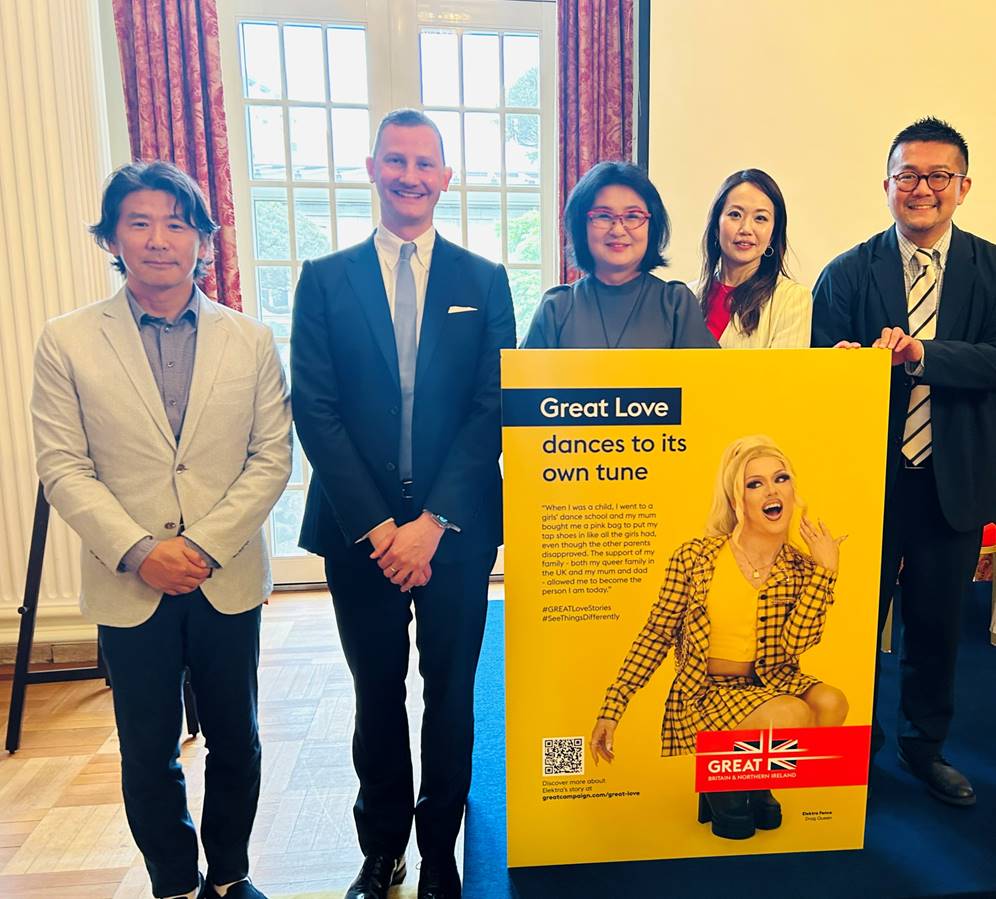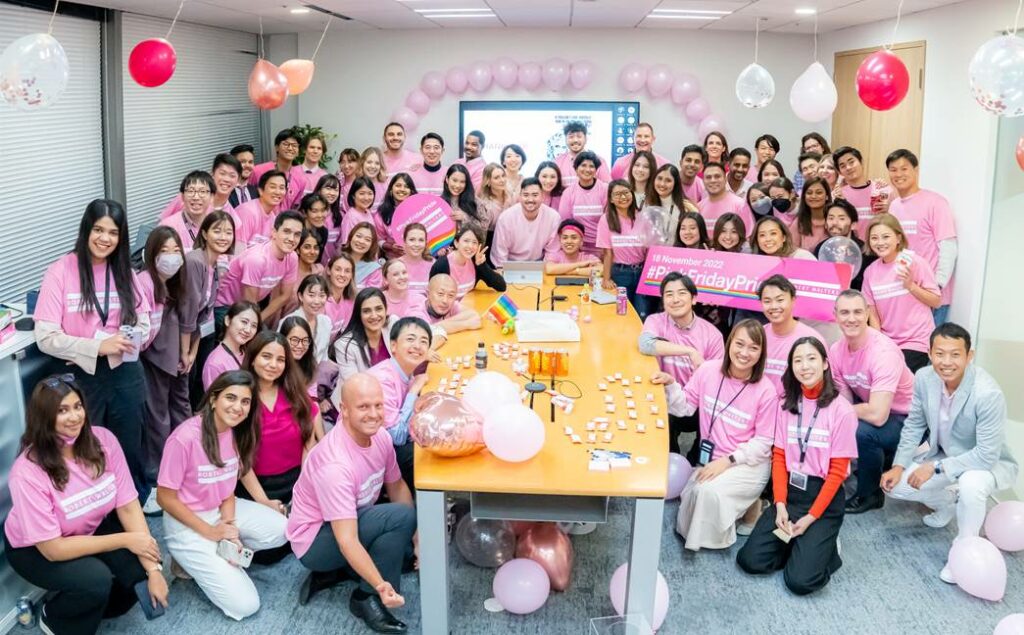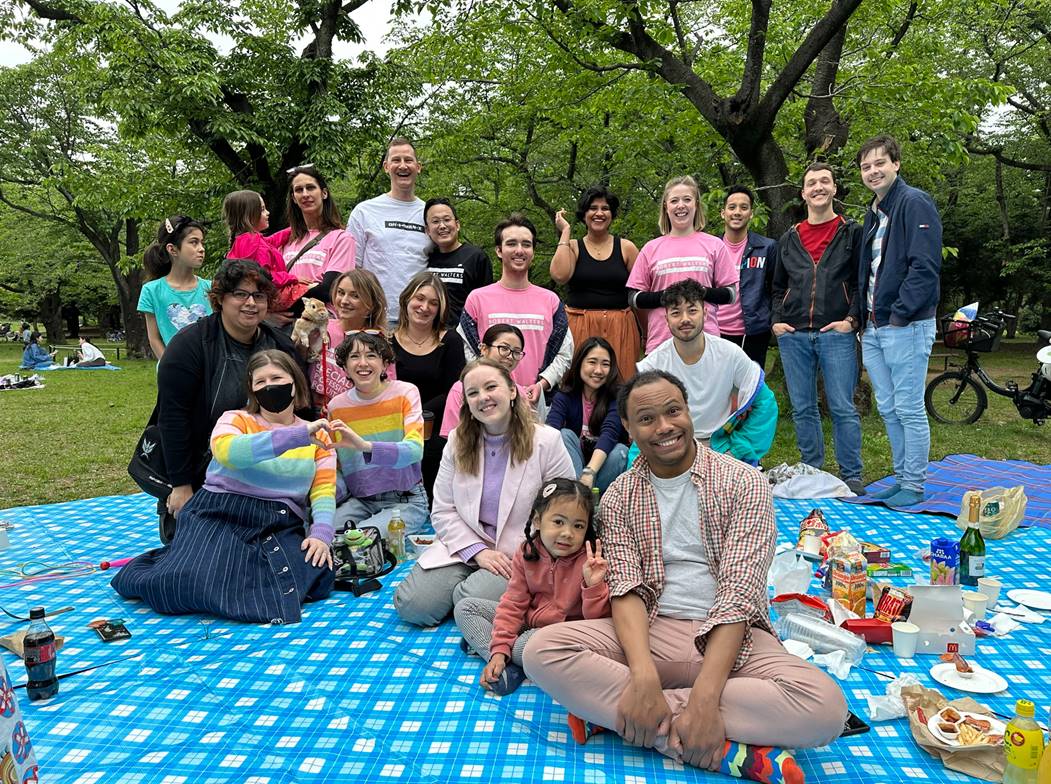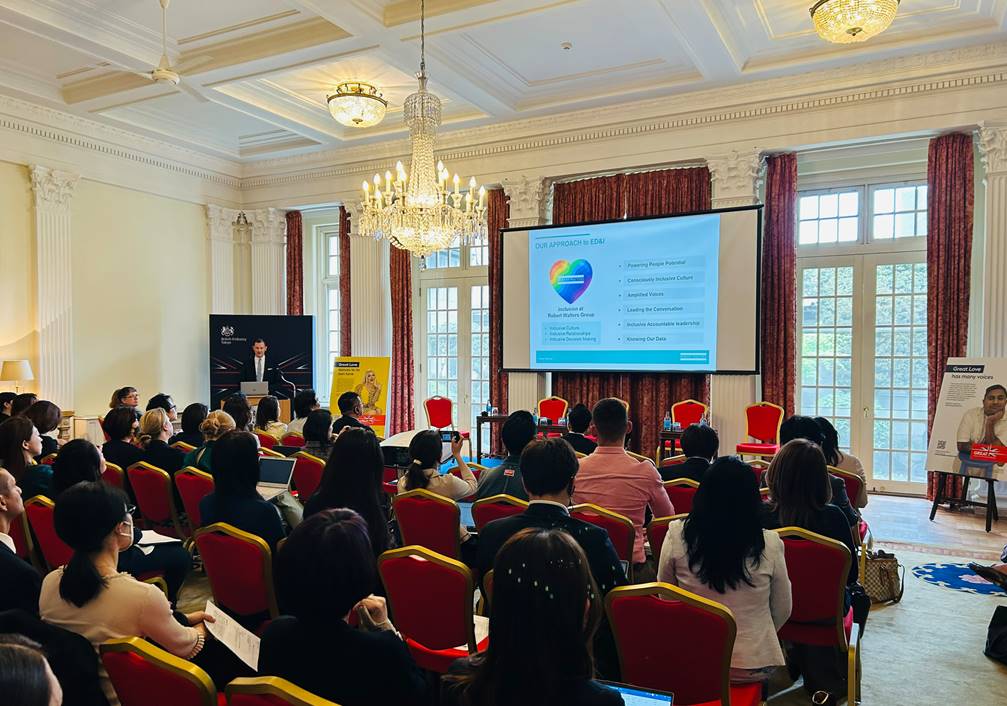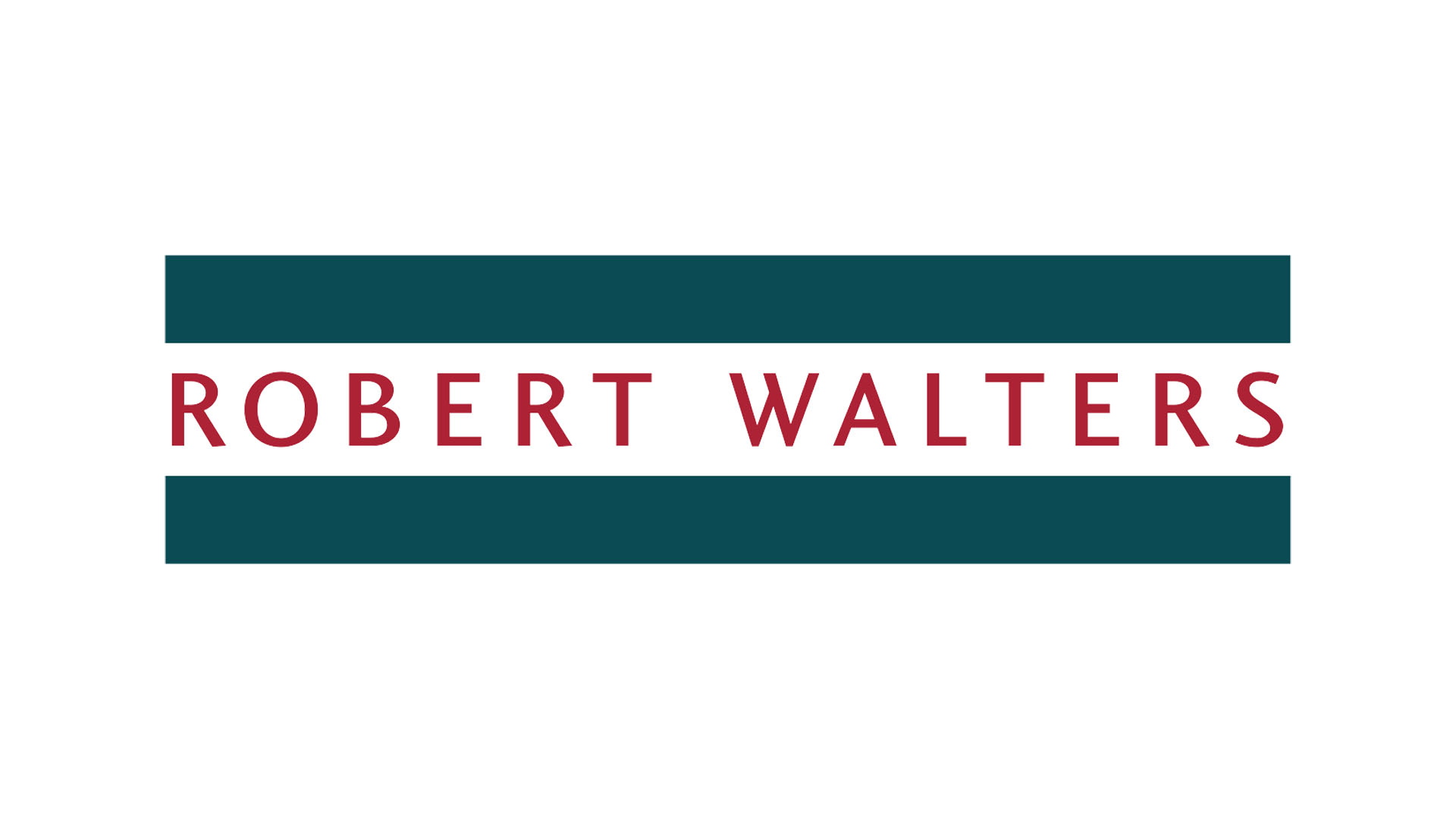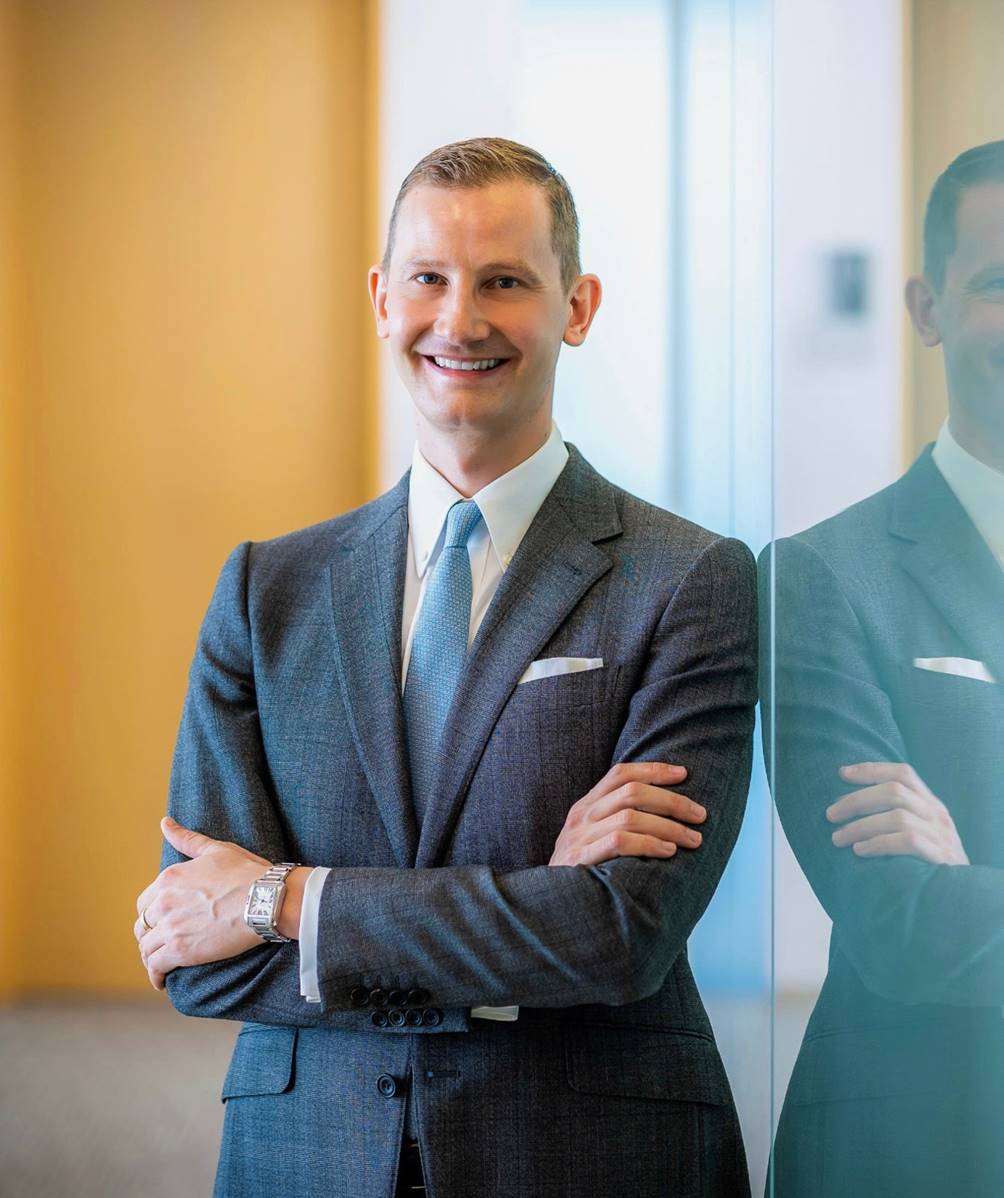Member? Please login
Robert Walters Japan x Global Pride Month Interview with BCCJ
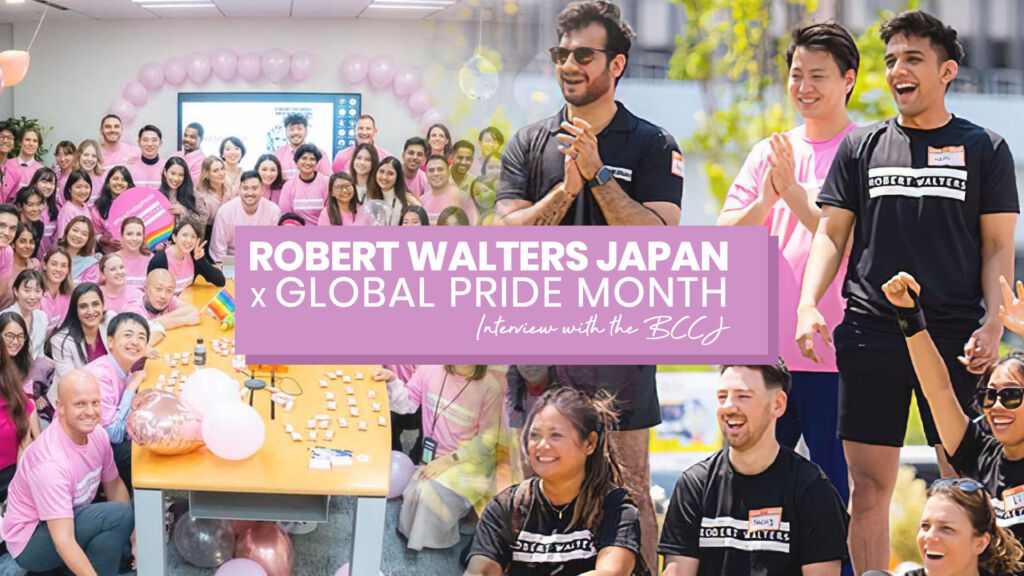
Written by BCCJ
June 15, 2023
Diversity & Inclusion, Member News
The BCCJ spoke with Joshua Bryan, Senior Director of Financial Services, Legal, HR & Support Division at Robert Walters Japan (RWJ) about how the team are marking global pride month this year. In this interview, we explore how to establish an inclusive workplace culture, Japan’s comprehension of LGBTQ+ requirements and why there is room for cautious optimism about what lies ahead, and why addressing diversity is so important in driving forward a progressive business agenda.
- Why does Robert Walters Japan believe it is absolutely essential to foster an ethos of equality and inclusivity and what does that message send to clients, stakeholders and maybe most importantly, employees?
Thank you for speaking with us today, Sarah. At Robert Walters, we’re deeply committed to fostering a culture of equality and inclusivity, as we believe that a diverse workforce and inclusive environments are crucial for unlocking innovation, driving organisational strength, and achieving success. Our core values and purpose centre around empowering people and organisations to fulfil their unique potential, and we recognise that diversity and inclusion are key enablers for our stakeholders to reach their goals and thrive.
We are fairly early in our own ED&I journey, having started organising with more structure since 2021, but we’re striving to be thought leaders and a “responsible corporate citizen” – meaning we want to learn from others and share what is working for us too. We definitely want to champion the benefits of environments where employees feel free and happy to be their true, authentic selves at work. An inclusive workforce, makes for a robust organisation and enhances creativity and innovation.
There are so many studies which highlight the tangible benefits of fostering an inclusive culture where there is a healthy sense of belonging among a diverse group of employees. In 2020 Boston Consulting Group reported that employees in inclusive cultures are 39% more likely to experience high job satisfaction, 27% more likely to stay at their company for more than five years, and 22% more likely to report high six times more likely to anticipate change and respond effectively, and twice as likely to meet or exceed financial targets. McKinsey’s research in 2019 also demonstrated that companies in the top quartile for gender diversity on executive teams were 25% more likely to have above-average profitability than companies in the fourth quartile, while those in the top quartile for ethnic and cultural diversity outperformed their counterparts by 36%.
By seeking to embed equality and inclusivity into the fabric of our company, we want to send a message to our clients, employees, candidates and also prospective employees too. We know that when people from diverse backgrounds work well together, like the 45 nationalities who work with us in Japan, we not only elevate individual and collective performance but also contribute to a more equitable and thriving society.
- Where is Japan currently in its understanding of LGBTQ+ inclusivity in the workplace?
Things have certainly changed a lot since 2007 when I joined Robert Walters. At the time ours and other work cultures were less inclusive, and it took me around 9 months to feel comfortable coming out to colleagues. In recent years in particular Japan has made big strides in terms of LGBTQ+ inclusivity in the workplace, with both local and international companies increasingly considering equity, diversity, and inclusion (ED&I) matters as they relate to their LGBTQ employees. Early efforts initiated by individuals like my friend Marc Rubinstein and other pioneers in the LGBT Finance network back in the mid-2000s marked the beginning of a shift towards a more inclusive corporate culture.
Allyship itself has come to be better understood also. A growing number of country leaders and corporate function heads have role-modelled what it means to be an ally – visibly so, and through their actions.
Early initiatives were bolstered by the work of pioneering HR leaders too, such as Ms. Yuki Higashi of Coca-Cola. Yuki and other HR leaders who are passionate allies like her, have made substantial contributions by driving greater understanding and empathy towards the LGBTQ community within their organisations. Through the early efforts of allies in both HR and leadership we have seen more inclusive language, leadership, and decision-making at companies like Nomura, Accenture, and Coca-Cola and many more over ten years ago.
In recent years, many companies have recognised the value of LGBTQ & Ally Employee Resource Groups (ERGs) as an important component in their LGBTQ inclusion strategies. Groups like our own “RW Pride ERG” serve as an effective means for peers to support one another across regions and provide a unified voice advocating for their community to leadership.
Companies have also sought to equalise their benefits provisions for employees, like giving leave equitably to employees for the care of partners regardless of gender or marital or civil union status.
Organisations such as Work with Pride, founded by Mr. Gon Matsunaka, have also played a significant role in promoting LGBTQ+ inclusivity in the workplace across businesses by encouraging employers to strive for the “Gold Standard” as assessed by Work with Pride. These helpful benchmarks for employers have given them a way to demonstrate their commitment to LGBTQ inclusion, and some ideas for concrete measures which can be taken.
British Ambassador’s Residence – DEI Seminar Presenter & Panelist Group Picture
We have also seen some recent efforts by Japanese companies and others to make work a more inclusive place for transgender employees. Many companies are choosing to remove “gender” from their official application forms, and are running training on LGBTQ for interviewers, creating gender-free toilets or clarifying their policies that transgender employees can use the toilet that they want to use. Some companies have also started to allow transgender employees to take medical leave when they go to get shots or have surgery.
- Are you familiar with the LGBTQ+ status of your workforce? Do you encourage employees to come out and express themselves, or take more of a neutral approach?
When I first joined our business at the age of 27, I had been living openly as a gay man for nearly ten years but I initially hesitated to disclose this aspect of my identity to colleagues. It took several months for me to feel confident that coming out would not hinder my career. Later I came to realise that coming out in my case might have enabled me to feel more at ease and self-assured at work. At that time back in 2008, I might have been the only openly gay individual in the Tokyo office of around 120 employees – and it was a daunting prospect at first.
The decision to come out is always one that must be taken at the involved person’s discretion, and at their preferred timing. Respect is most important, and recognising that no single aspect defines a person’s identity. For instance, in addition to being a gay man, I’m also a father to two sons, a leader, British, proudly European still, a 20 year Japan resident – and I’m quite proud of all of these parts of my identity!
Over the last 15 years I’ve been fortunate enough to witness a significant change in the level of comfort and confidence my gay and lesbian colleagues, and also transgender colleagues, many of whom are now openly sharing their identities with ease.
On the question of whether we encourage employees to disclose their LGBTQ+ status, our primary focus is on creating an environment in which everyone, not just LGBTQ+ folks, can be their authentic selves. We are trying to promote open conversations about diversity and inclusion, and to that end we have established several Employee Resource Groups, such as our Pride ERG, as a forum for LGBTQ+ employees and their allies. We also have ERGs for people with disabilities and the neurodiverse, and another for families.
- What sort of initiatives is Robert Walters Japan involved in that highlight the company’s stance on LGBTQ+ inclusivity?
Pink Friday
We have implemented various initiatives to showcase our support for LGBTQ+ community. One of our favourite local ED&I council initiatives in recent years has been “Pink Friday.” This event, on a Friday in November, offers employees an optional opportunity to demonstrate their allyship for the community by wearing a pink clothing item or accessory. In conjunction with this visual show of support, last year we hosted an engaging colleague-led seminar, which featured authentic and diverse voices from our LGBTQ community, including a transgender male, a young Japanese gay man, an Indian lesbian, and a woman who became a passionate ally following her brother’s coming out experience.
Another significant initiative is our active participation in Tokyo Rainbow Pride over the years. Colleagues have shown their support by joining marches through the streets of Shibuya and this year several pulled together to organise a family-friendly “inclusivity picnic” at a park near the main event.
Rainbow Pride Picnic in Yoyogi Park
In addition to these internal efforts, we’re proud of our external partnerships, which are often led by our council, leadership, or marketing teams. We collaborate with local third-party organisations such as the BCCJ, Work with Pride, and Business for Marriage Equality to advance our shared goals. One notable example of this collaboration is our collective effort with other businesses to encourage the Japanese government to prioritise LGBT equity and discrimination protection, aligning with the standards of other G7 nations attending the G7 summit last month.
For global pride month, this June, we are working with Lawyers for LGBT and Allies Network to host a seminar on the state of LGBTQ legal rights in Japan, with invited guests hearing from four experts, in English, on relationship recognition, immigration, and families from the perspective of the law.
Furthermore, we have our general group ED&I Statement prominently displayed in our offices as a constant reminder externally and internally of our commitment to creating a workplace that is equitable, diverse, and inclusive. It’s a simple but meaningful tool to indicate our dedication to fostering an environment where everyone feels welcomed and valued, including regardless of their sexual orientation or gender identity.
- Do you receive much feedback on these, positive or otherwise, from employees and clients alike?
Certainly, we’ve received plenty of feedback from colleagues and clients about our ED&I initiatives. From colleagues the feedback so far has been reassuringly positive, and has included notes about requested additional ED&I priorities for us too – like this year we will be paying closer attention to ethnicities, religions and disabilities and neurodiversity.
At the timing of our last survey on these matters, colleagues’ responses included folks who noted “great supportive and accepting atmosphere” and that our “diversity is more ‘visible'”. It is good to see the growing comfort and acceptance of our diverse workforce. A heightened awareness of our own behaviour and speech has also been observed. We’ve seen remarks like “colleagues are more cautious and have greater awareness of the effects of their behaviour & speech” and that we are seeing “more inclusive behaviours.” It does feel to me also that I’m personally seeing more conscientious communication, helping reduce inadvertently less inclusive interactions. Another promising development is the empowerment of our staff to call out unsuitable behaviour, as one respondent to our survey noted it has become “easier to flag it to incorrect behaviour”. We also saw comments noting an increased “openness & celebration of differences” and a “higher level of cultural awareness”.
British Ambassador’s Residence – Joshua Bryan Presenting at DEI Seminar
From a business perspective, the ED&I initiatives have reaped some concrete rewards. We’ve observed a 43% improvement in retention and reduction in turnover in the NEA region from 2019 to 2022, a clear indicator that our workforce is more content and committed. Also we are thrilled to have seen the rise in the proportion of women in management roles from 30% in 2019 to 38% in 2022.
In terms of our clients, we’ve found many to share our commitment to ED&I and interested in exchanging ideas and experiences. We have actively collaborated with several clients large and small, Japanese and international, on broader ED&I matters or more specifically LGBTQ+ inclusion. Our leadership, particularly Tokyo MD Rachna and North East Asia CEO Jeremy, seize these opportunities to share our experiences and learn from each other.
One of the challenges I have seen in my role is how bias can be introduced to even the most robust recruitment processes. Often this bias is hidden and unintentional but can disadvantage under-represented talent, including the LGBTQ+ community. Our Diverse Hiring Practice at Robert Walters have developed a Recruitment Inclusivity Audit to minimise bias and barriers in our client’s hiring. We are really excited this year to be rolling out this Audit for clients in Japan. This end-to-end service has already garnered numerous awards in the UK and Europe, and we are excited about the potential positive impacts it should bring to recruitment processes here in Japan also.
- What’s next for LGBTQ+ in Japan? And how can companies nurture a culture of understanding and help push for community protections?
I’m personally excited and optimistic about the more inclusive Japan we are quickly moving towards. Public sentiment has been shifting in favour of progress, with a majority now approving of equal access to marriage for same-sex couples. In fact, there is overwhelming support for marriage equality among younger generations – with close to 90% of Japanese people under 30 now in favour of marriage equality according to recent polling by the Kyodo news agency. As more companies prioritise diversity and inclusion and the government takes steps to protect LGBTQ+ individuals from discrimination, Japan will likely continue to make advances towards being a fairer place for its LGBTQ+ community.
This continued progress will depend on the ongoing efforts of organisations, activists, and allies, including the business community, working together to create a more inclusive and equitable society for all.
I would like to encourage business leaders to look to both establish more inclusive environments within their organisations, but also to live their values through meaningful external action and collaboration. This means finding their voice by joining with other businesses with initiatives like endorsing marriage equality through Business for Marriage Equality (https://bformarriageequality.net/), or signing up to joint corporate letters. On several occasions we have seen joint efforts from sets of companies, or the BCCJ with ACCJ, co-signing letters advocating to the government for progressive change and greater equality including for the 8.9% of us in Japan (Dentsu, 2019) who identify as members of the LGBTQ community. Measures like these create a ripple of motivating energy, impacting on our community directly, as well as those with the power to change Japan, as we all hope, for the better.

